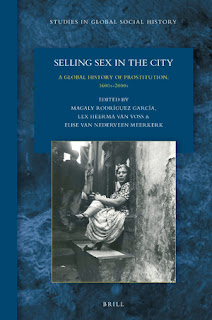Book: the disappearance of Lydia Harvey
Dr. Julia Laite recently published a true story about a sixteen-year-old girl, Lydia Harvey, who ends up in prostitution. (1) The story is set in 1910 when Lydia receives an attractive offer to travel abroad and earn a lot of money. The New Zealand girl, who longs for adventure and the chance to travel, gladly accepts the offer. The rise of commercial steamboats during that period makes journeys to other parts of the world easier. Lydia leaves her home country, takes the boat to Buenos Aires, and eventually ends up in London. Despite the traveling, life does not turn out as she had hoped. She even becomes a crown witness in a British court case against her procurers. Due to the extensive (archival) research, this book offers a real insight into the world of international prostitution at the beginning of the twentieth century.
Different angles
Different angles
One of the things I enjoyed about this book is that it tells the story from different angles, not just from Lydia's. (2) Each chapter features the experiences of one of the persons involved, such as the procurers, the police detective, the social worker, and a journalist reporting on the court case. It provides a fascinating glimpse into the past, viewed from various lifecycles that come together. Moreover, the stories are placed in the broader political and social-cultural context of that time. I found this a relief since it is often lacking in historical novels, which could make choices made by the characters difficult to comprehend. This book tries to find a balance between describing the lifecycles of individuals on the one hand and explaining the broad political and social-cultural frameworks they live in on the other. Only in the chapter on the newsman, the individual story is partly snowed under by the extensive description of "white slavery". (p113-121)
Historical genre
Historical genre
The genre of this work is somewhere between a scientific monograph and a historic novel. While in the latter it is not always clear which part is fiction and which is based on archival research, this is hardly a question here. I am glad extensive notes with source references are added. Laite has clearly conducted an enormous amount of (archival) research and obtains impressive substantive knowledge about the topic. In addition, the book is not a purely scientific monograph but written narratively.
The result is a pleasantly readable book that provides a realistic image of society and the way people make choices within it.
The Guardian reviewed the book and BBC History Magazine & History Revealed made an interesting History Extra podcast on the book.
Noten
(1) Julia Laite, The disappearance of Lydia Harvey (London 2021). More details (ISBN etc)
(2) It reminded me of the wonderful novels by Irish writer Maeve Binchy who had a similar approach in her books by telling the stories from the angles of the different characters, for instance, Evening Class (1996) or A week in winter (2012).




Comments
Post a Comment